Racism in The Reluctant Fundamentalist
VerifiedAdded on 2020/04/13
|6
|1492
|1528
AI Summary
This assignment examines the portrayal of racism in Mohsin Hamid's novel, *The Reluctant Fundamentalist*. It explores how the novel depicts the protagonist's changing perceptions of American society and his own identity as he encounters prejudice and discrimination. The analysis draws parallels between the fictional narrative and real-world experiences of racial inequality, highlighting the impact of societal stereotypes and biases.
Contribute Materials
Your contribution can guide someone’s learning journey. Share your
documents today.
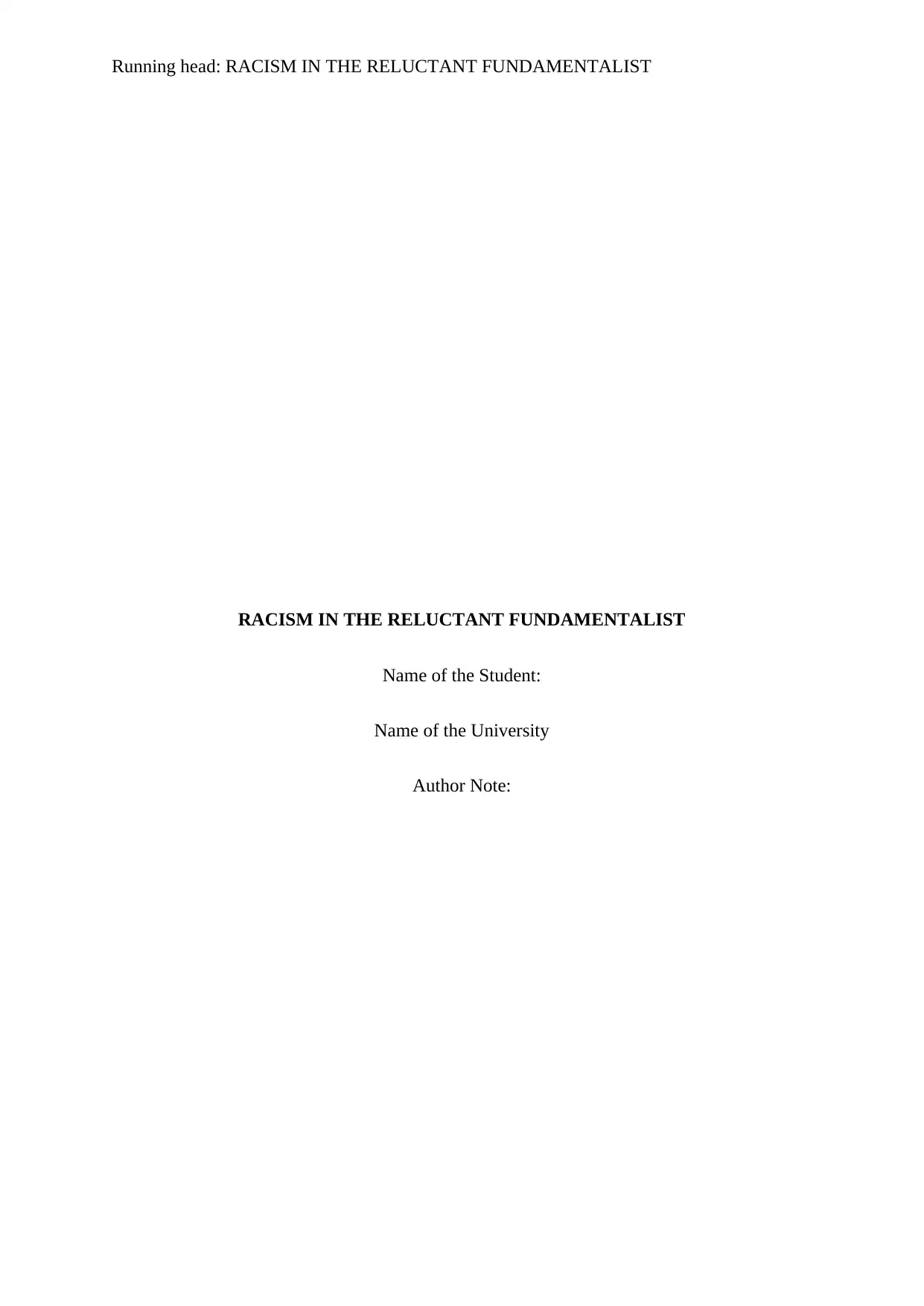
Running head: RACISM IN THE RELUCTANT FUNDAMENTALIST
RACISM IN THE RELUCTANT FUNDAMENTALIST
Name of the Student:
Name of the University
Author Note:
RACISM IN THE RELUCTANT FUNDAMENTALIST
Name of the Student:
Name of the University
Author Note:
Secure Best Marks with AI Grader
Need help grading? Try our AI Grader for instant feedback on your assignments.
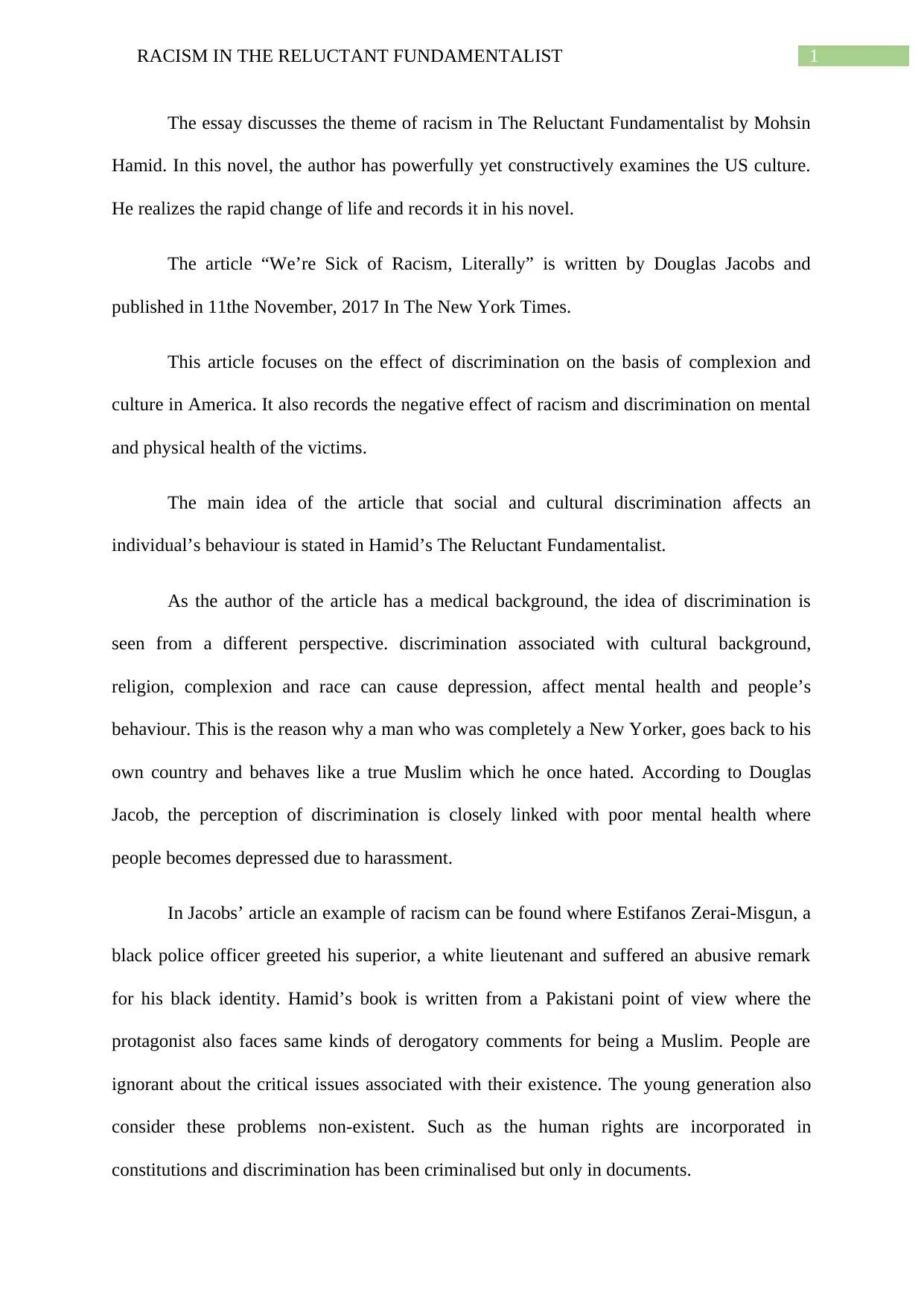
1RACISM IN THE RELUCTANT FUNDAMENTALIST
The essay discusses the theme of racism in The Reluctant Fundamentalist by Mohsin
Hamid. In this novel, the author has powerfully yet constructively examines the US culture.
He realizes the rapid change of life and records it in his novel.
The article “We’re Sick of Racism, Literally” is written by Douglas Jacobs and
published in 11the November, 2017 In The New York Times.
This article focuses on the effect of discrimination on the basis of complexion and
culture in America. It also records the negative effect of racism and discrimination on mental
and physical health of the victims.
The main idea of the article that social and cultural discrimination affects an
individual’s behaviour is stated in Hamid’s The Reluctant Fundamentalist.
As the author of the article has a medical background, the idea of discrimination is
seen from a different perspective. discrimination associated with cultural background,
religion, complexion and race can cause depression, affect mental health and people’s
behaviour. This is the reason why a man who was completely a New Yorker, goes back to his
own country and behaves like a true Muslim which he once hated. According to Douglas
Jacob, the perception of discrimination is closely linked with poor mental health where
people becomes depressed due to harassment.
In Jacobs’ article an example of racism can be found where Estifanos Zerai-Misgun, a
black police officer greeted his superior, a white lieutenant and suffered an abusive remark
for his black identity. Hamid’s book is written from a Pakistani point of view where the
protagonist also faces same kinds of derogatory comments for being a Muslim. People are
ignorant about the critical issues associated with their existence. The young generation also
consider these problems non-existent. Such as the human rights are incorporated in
constitutions and discrimination has been criminalised but only in documents.
The essay discusses the theme of racism in The Reluctant Fundamentalist by Mohsin
Hamid. In this novel, the author has powerfully yet constructively examines the US culture.
He realizes the rapid change of life and records it in his novel.
The article “We’re Sick of Racism, Literally” is written by Douglas Jacobs and
published in 11the November, 2017 In The New York Times.
This article focuses on the effect of discrimination on the basis of complexion and
culture in America. It also records the negative effect of racism and discrimination on mental
and physical health of the victims.
The main idea of the article that social and cultural discrimination affects an
individual’s behaviour is stated in Hamid’s The Reluctant Fundamentalist.
As the author of the article has a medical background, the idea of discrimination is
seen from a different perspective. discrimination associated with cultural background,
religion, complexion and race can cause depression, affect mental health and people’s
behaviour. This is the reason why a man who was completely a New Yorker, goes back to his
own country and behaves like a true Muslim which he once hated. According to Douglas
Jacob, the perception of discrimination is closely linked with poor mental health where
people becomes depressed due to harassment.
In Jacobs’ article an example of racism can be found where Estifanos Zerai-Misgun, a
black police officer greeted his superior, a white lieutenant and suffered an abusive remark
for his black identity. Hamid’s book is written from a Pakistani point of view where the
protagonist also faces same kinds of derogatory comments for being a Muslim. People are
ignorant about the critical issues associated with their existence. The young generation also
consider these problems non-existent. Such as the human rights are incorporated in
constitutions and discrimination has been criminalised but only in documents.
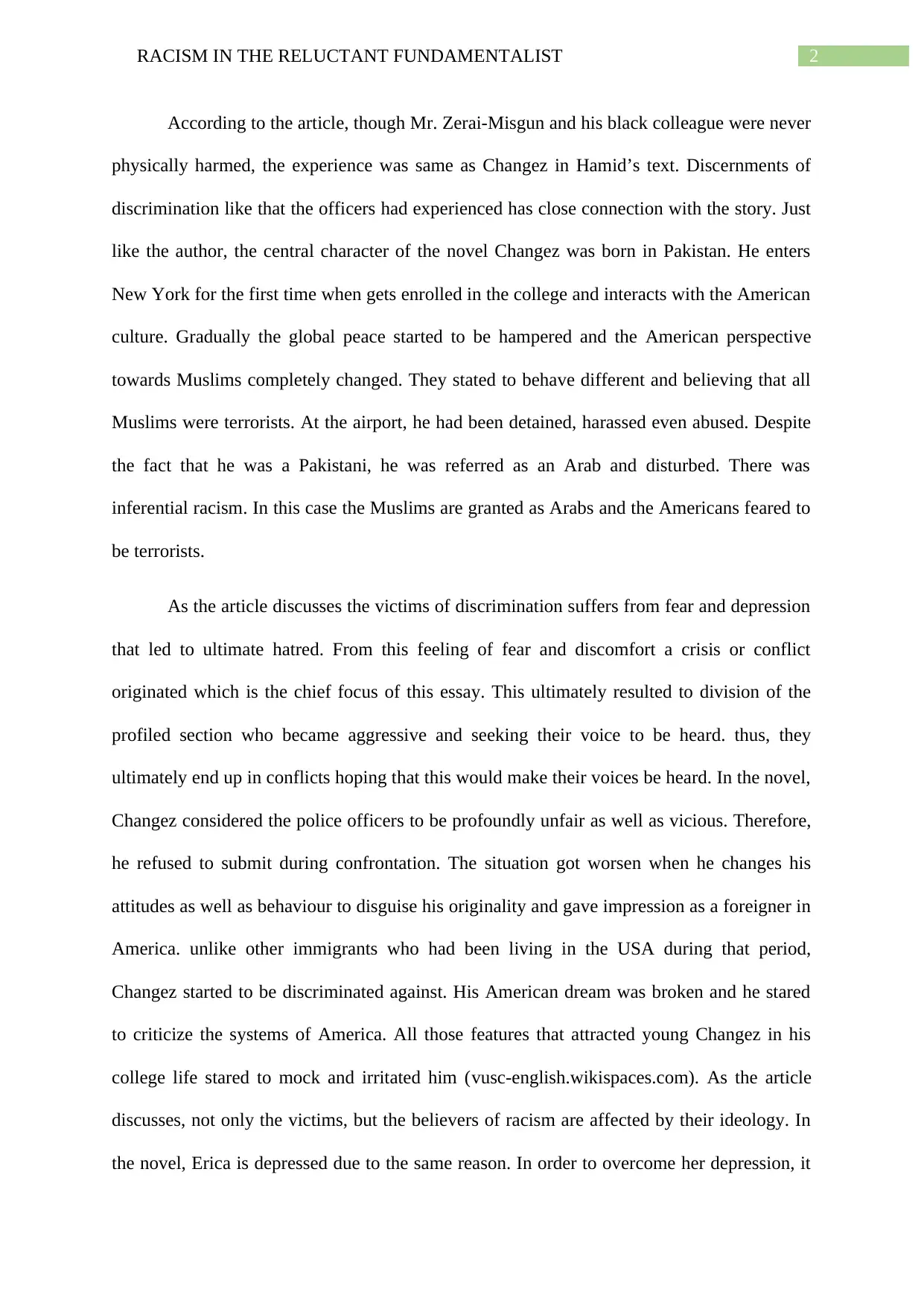
2RACISM IN THE RELUCTANT FUNDAMENTALIST
According to the article, though Mr. Zerai-Misgun and his black colleague were never
physically harmed, the experience was same as Changez in Hamid’s text. Discernments of
discrimination like that the officers had experienced has close connection with the story. Just
like the author, the central character of the novel Changez was born in Pakistan. He enters
New York for the first time when gets enrolled in the college and interacts with the American
culture. Gradually the global peace started to be hampered and the American perspective
towards Muslims completely changed. They stated to behave different and believing that all
Muslims were terrorists. At the airport, he had been detained, harassed even abused. Despite
the fact that he was a Pakistani, he was referred as an Arab and disturbed. There was
inferential racism. In this case the Muslims are granted as Arabs and the Americans feared to
be terrorists.
As the article discusses the victims of discrimination suffers from fear and depression
that led to ultimate hatred. From this feeling of fear and discomfort a crisis or conflict
originated which is the chief focus of this essay. This ultimately resulted to division of the
profiled section who became aggressive and seeking their voice to be heard. thus, they
ultimately end up in conflicts hoping that this would make their voices be heard. In the novel,
Changez considered the police officers to be profoundly unfair as well as vicious. Therefore,
he refused to submit during confrontation. The situation got worsen when he changes his
attitudes as well as behaviour to disguise his originality and gave impression as a foreigner in
America. unlike other immigrants who had been living in the USA during that period,
Changez started to be discriminated against. His American dream was broken and he stared
to criticize the systems of America. All those features that attracted young Changez in his
college life stared to mock and irritated him (vusc-english.wikispaces.com). As the article
discusses, not only the victims, but the believers of racism are affected by their ideology. In
the novel, Erica is depressed due to the same reason. In order to overcome her depression, it
According to the article, though Mr. Zerai-Misgun and his black colleague were never
physically harmed, the experience was same as Changez in Hamid’s text. Discernments of
discrimination like that the officers had experienced has close connection with the story. Just
like the author, the central character of the novel Changez was born in Pakistan. He enters
New York for the first time when gets enrolled in the college and interacts with the American
culture. Gradually the global peace started to be hampered and the American perspective
towards Muslims completely changed. They stated to behave different and believing that all
Muslims were terrorists. At the airport, he had been detained, harassed even abused. Despite
the fact that he was a Pakistani, he was referred as an Arab and disturbed. There was
inferential racism. In this case the Muslims are granted as Arabs and the Americans feared to
be terrorists.
As the article discusses the victims of discrimination suffers from fear and depression
that led to ultimate hatred. From this feeling of fear and discomfort a crisis or conflict
originated which is the chief focus of this essay. This ultimately resulted to division of the
profiled section who became aggressive and seeking their voice to be heard. thus, they
ultimately end up in conflicts hoping that this would make their voices be heard. In the novel,
Changez considered the police officers to be profoundly unfair as well as vicious. Therefore,
he refused to submit during confrontation. The situation got worsen when he changes his
attitudes as well as behaviour to disguise his originality and gave impression as a foreigner in
America. unlike other immigrants who had been living in the USA during that period,
Changez started to be discriminated against. His American dream was broken and he stared
to criticize the systems of America. All those features that attracted young Changez in his
college life stared to mock and irritated him (vusc-english.wikispaces.com). As the article
discusses, not only the victims, but the believers of racism are affected by their ideology. In
the novel, Erica is depressed due to the same reason. In order to overcome her depression, it
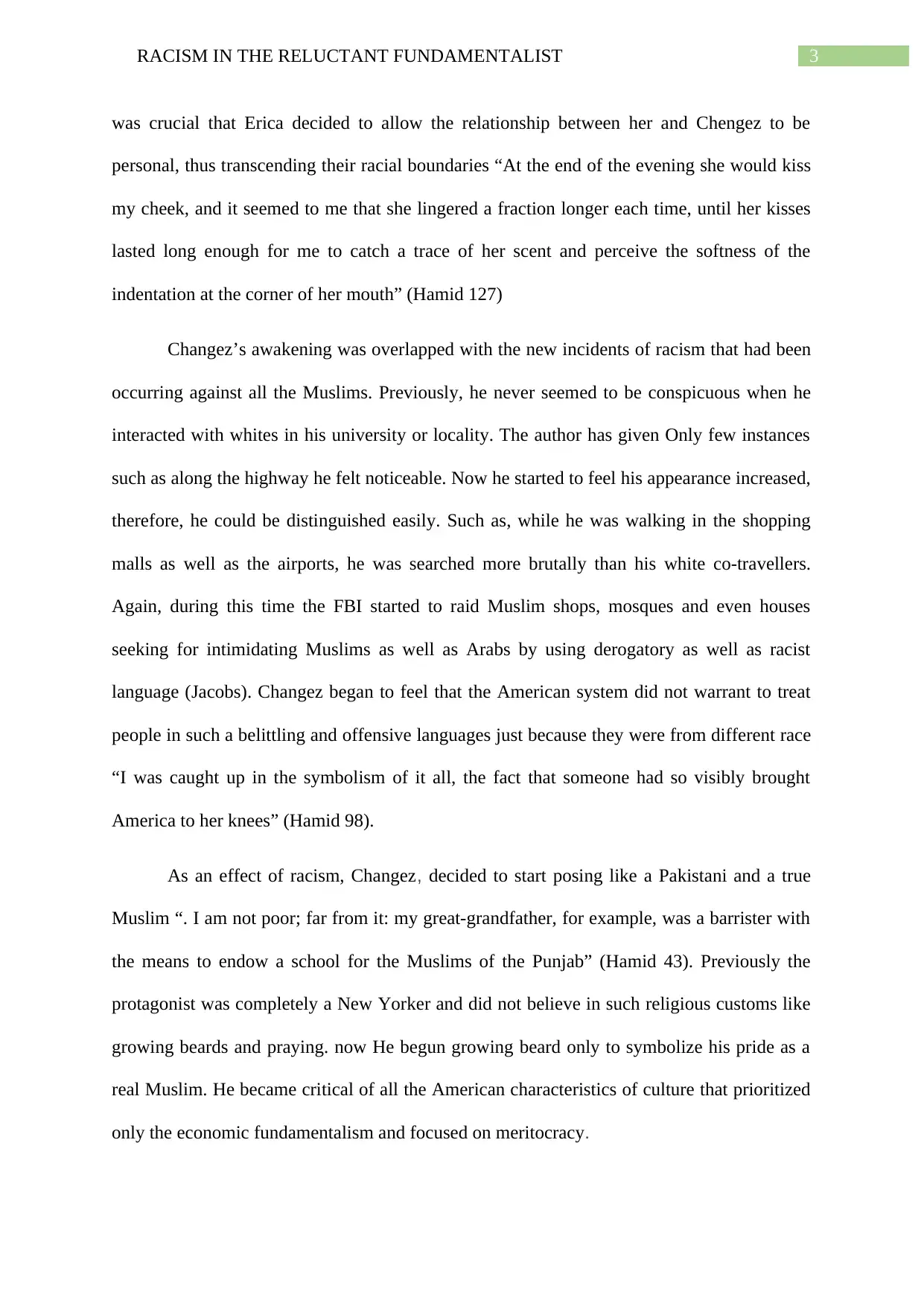
3RACISM IN THE RELUCTANT FUNDAMENTALIST
was crucial that Erica decided to allow the relationship between her and Chengez to be
personal, thus transcending their racial boundaries “At the end of the evening she would kiss
my cheek, and it seemed to me that she lingered a fraction longer each time, until her kisses
lasted long enough for me to catch a trace of her scent and perceive the softness of the
indentation at the corner of her mouth” (Hamid 127)
Changez’s awakening was overlapped with the new incidents of racism that had been
occurring against all the Muslims. Previously, he never seemed to be conspicuous when he
interacted with whites in his university or locality. The author has given Only few instances
such as along the highway he felt noticeable. Now he started to feel his appearance increased,
therefore, he could be distinguished easily. Such as, while he was walking in the shopping
malls as well as the airports, he was searched more brutally than his white co-travellers.
Again, during this time the FBI started to raid Muslim shops, mosques and even houses
seeking for intimidating Muslims as well as Arabs by using derogatory as well as racist
language (Jacobs). Changez began to feel that the American system did not warrant to treat
people in such a belittling and offensive languages just because they were from different race
“I was caught up in the symbolism of it all, the fact that someone had so visibly brought
America to her knees” (Hamid 98).
As an effect of racism, Changez, decided to start posing like a Pakistani and a true
Muslim “. I am not poor; far from it: my great-grandfather, for example, was a barrister with
the means to endow a school for the Muslims of the Punjab” (Hamid 43). Previously the
protagonist was completely a New Yorker and did not believe in such religious customs like
growing beards and praying. now He begun growing beard only to symbolize his pride as a
real Muslim. He became critical of all the American characteristics of culture that prioritized
only the economic fundamentalism and focused on meritocracy.
was crucial that Erica decided to allow the relationship between her and Chengez to be
personal, thus transcending their racial boundaries “At the end of the evening she would kiss
my cheek, and it seemed to me that she lingered a fraction longer each time, until her kisses
lasted long enough for me to catch a trace of her scent and perceive the softness of the
indentation at the corner of her mouth” (Hamid 127)
Changez’s awakening was overlapped with the new incidents of racism that had been
occurring against all the Muslims. Previously, he never seemed to be conspicuous when he
interacted with whites in his university or locality. The author has given Only few instances
such as along the highway he felt noticeable. Now he started to feel his appearance increased,
therefore, he could be distinguished easily. Such as, while he was walking in the shopping
malls as well as the airports, he was searched more brutally than his white co-travellers.
Again, during this time the FBI started to raid Muslim shops, mosques and even houses
seeking for intimidating Muslims as well as Arabs by using derogatory as well as racist
language (Jacobs). Changez began to feel that the American system did not warrant to treat
people in such a belittling and offensive languages just because they were from different race
“I was caught up in the symbolism of it all, the fact that someone had so visibly brought
America to her knees” (Hamid 98).
As an effect of racism, Changez, decided to start posing like a Pakistani and a true
Muslim “. I am not poor; far from it: my great-grandfather, for example, was a barrister with
the means to endow a school for the Muslims of the Punjab” (Hamid 43). Previously the
protagonist was completely a New Yorker and did not believe in such religious customs like
growing beards and praying. now He begun growing beard only to symbolize his pride as a
real Muslim. He became critical of all the American characteristics of culture that prioritized
only the economic fundamentalism and focused on meritocracy.
Secure Best Marks with AI Grader
Need help grading? Try our AI Grader for instant feedback on your assignments.
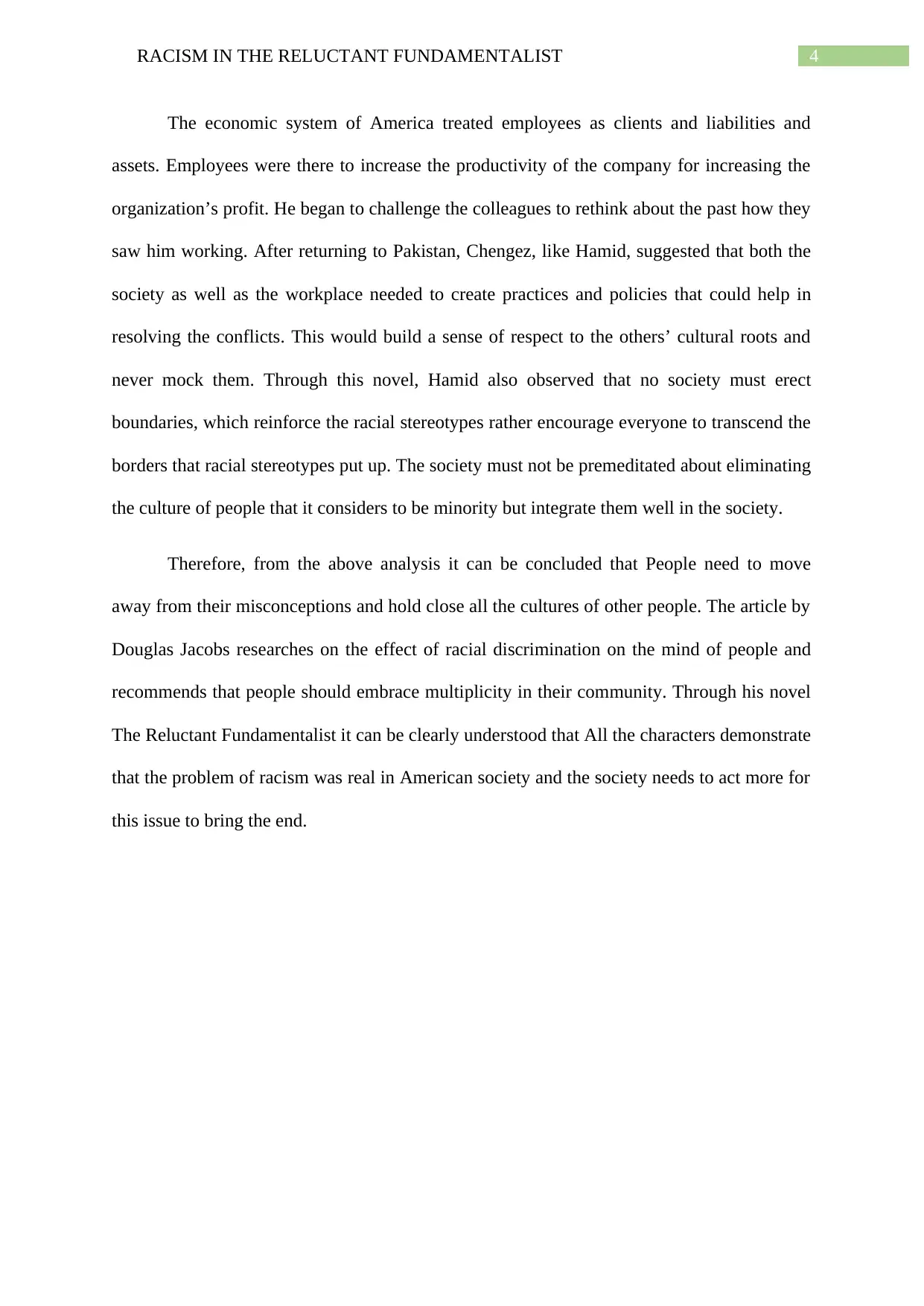
4RACISM IN THE RELUCTANT FUNDAMENTALIST
The economic system of America treated employees as clients and liabilities and
assets. Employees were there to increase the productivity of the company for increasing the
organization’s profit. He began to challenge the colleagues to rethink about the past how they
saw him working. After returning to Pakistan, Chengez, like Hamid, suggested that both the
society as well as the workplace needed to create practices and policies that could help in
resolving the conflicts. This would build a sense of respect to the others’ cultural roots and
never mock them. Through this novel, Hamid also observed that no society must erect
boundaries, which reinforce the racial stereotypes rather encourage everyone to transcend the
borders that racial stereotypes put up. The society must not be premeditated about eliminating
the culture of people that it considers to be minority but integrate them well in the society.
Therefore, from the above analysis it can be concluded that People need to move
away from their misconceptions and hold close all the cultures of other people. The article by
Douglas Jacobs researches on the effect of racial discrimination on the mind of people and
recommends that people should embrace multiplicity in their community. Through his novel
The Reluctant Fundamentalist it can be clearly understood that All the characters demonstrate
that the problem of racism was real in American society and the society needs to act more for
this issue to bring the end.
The economic system of America treated employees as clients and liabilities and
assets. Employees were there to increase the productivity of the company for increasing the
organization’s profit. He began to challenge the colleagues to rethink about the past how they
saw him working. After returning to Pakistan, Chengez, like Hamid, suggested that both the
society as well as the workplace needed to create practices and policies that could help in
resolving the conflicts. This would build a sense of respect to the others’ cultural roots and
never mock them. Through this novel, Hamid also observed that no society must erect
boundaries, which reinforce the racial stereotypes rather encourage everyone to transcend the
borders that racial stereotypes put up. The society must not be premeditated about eliminating
the culture of people that it considers to be minority but integrate them well in the society.
Therefore, from the above analysis it can be concluded that People need to move
away from their misconceptions and hold close all the cultures of other people. The article by
Douglas Jacobs researches on the effect of racial discrimination on the mind of people and
recommends that people should embrace multiplicity in their community. Through his novel
The Reluctant Fundamentalist it can be clearly understood that All the characters demonstrate
that the problem of racism was real in American society and the society needs to act more for
this issue to bring the end.
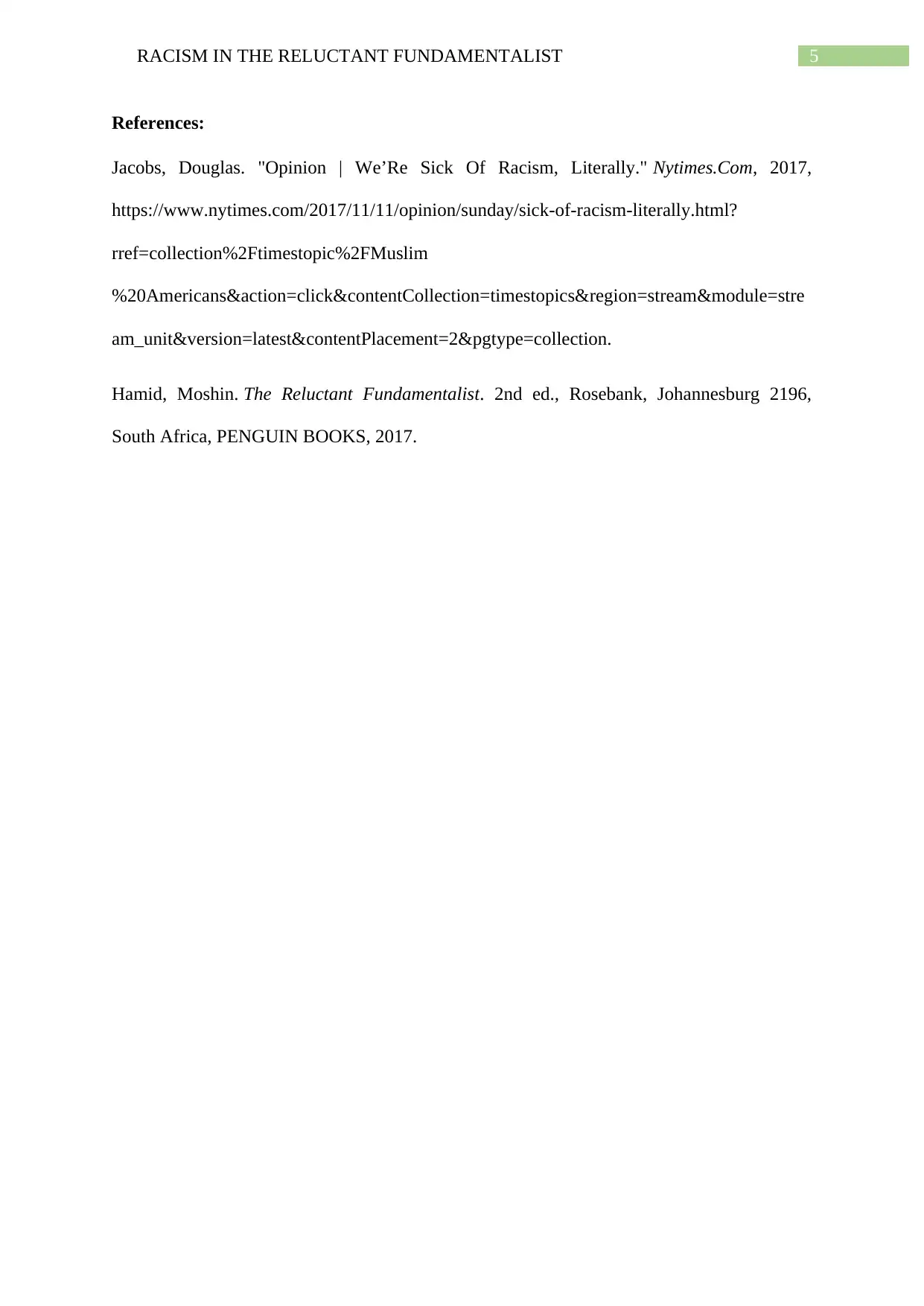
5RACISM IN THE RELUCTANT FUNDAMENTALIST
References:
Jacobs, Douglas. "Opinion | We’Re Sick Of Racism, Literally." Nytimes.Com, 2017,
https://www.nytimes.com/2017/11/11/opinion/sunday/sick-of-racism-literally.html?
rref=collection%2Ftimestopic%2FMuslim
%20Americans&action=click&contentCollection=timestopics®ion=stream&module=stre
am_unit&version=latest&contentPlacement=2&pgtype=collection.
Hamid, Moshin. The Reluctant Fundamentalist. 2nd ed., Rosebank, Johannesburg 2196,
South Africa, PENGUIN BOOKS, 2017.
References:
Jacobs, Douglas. "Opinion | We’Re Sick Of Racism, Literally." Nytimes.Com, 2017,
https://www.nytimes.com/2017/11/11/opinion/sunday/sick-of-racism-literally.html?
rref=collection%2Ftimestopic%2FMuslim
%20Americans&action=click&contentCollection=timestopics®ion=stream&module=stre
am_unit&version=latest&contentPlacement=2&pgtype=collection.
Hamid, Moshin. The Reluctant Fundamentalist. 2nd ed., Rosebank, Johannesburg 2196,
South Africa, PENGUIN BOOKS, 2017.
1 out of 6
Your All-in-One AI-Powered Toolkit for Academic Success.
+13062052269
info@desklib.com
Available 24*7 on WhatsApp / Email
![[object Object]](/_next/static/media/star-bottom.7253800d.svg)
Unlock your academic potential
© 2024 | Zucol Services PVT LTD | All rights reserved.